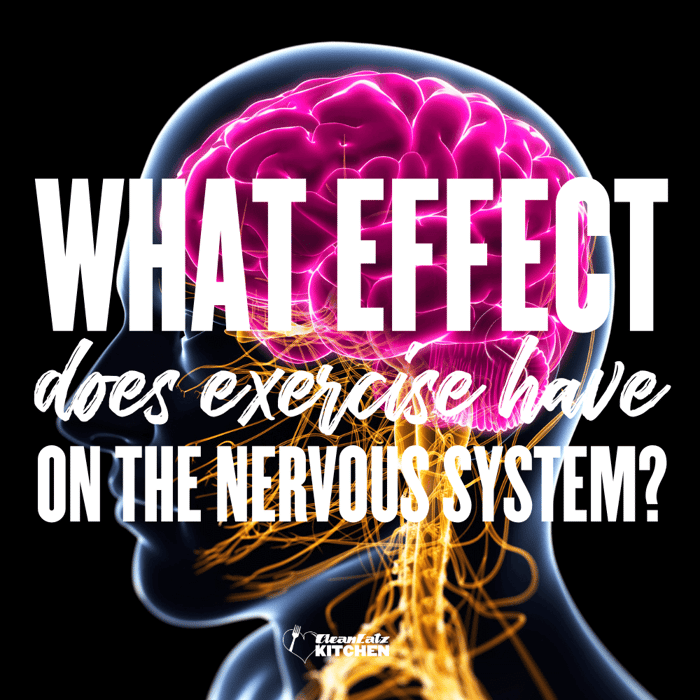What effect does exercise have on the nervous system? Most of us understand that it's beneficial for the body, but how does it impact the intricate web of nerves within us? We've all experienced the direct results of physical activity: better energy levels, improved sleep, and potential weight loss. But to delve deeper into its impact on our nervous system, let's explore its composition and function.
The nervous system plays a pivotal role in transmitting signals between the brain and every other part of our body. It orchestrates critical life functions such as breathing, digestion, and movement.
Wondering how these functions relate to the main question of what effect does exercise have on the nervous system? Continue reading to gain insights.
Diving into the Components of the Nervous System
The nervous system, a sophisticated network, facilitates communication between the brain and the entirety of our body. This includes the brain itself, the spinal cord, and a myriad of nerves transmitting messages throughout.
There are two primary divisions: the central nervous system (CNS), encompassing the brain and spinal cord, and the peripheral nervous system (PNS), which includes a myriad of other nerves. While the CNS governs both voluntary actions like walking and involuntary ones like heartbeats, the PNS is responsible for conveying sensory data like temperature and pain to the CNS, and instructions from the CNS to our muscles.
What Effect Does Exercise Have on the Nervous System?
When you engage in physical activity, what effect does exercise have on the nervous system? It prompts your body to release neurotransmitters and endorphins. These chemicals journey to your brain, directly influencing your mood. Thus, exercise can elevate your spirits.
Endorphins, a kind of neurotransmitter, inhibit pain signals in your brain. That's why post a rigorous workout, you might overlook the discomfort in your feet. Exercise also prompts the release of norepinephrine and epinephrine. The former boosts heart rate and blood pressure, while the latter triggers the "fight or flight" reaction.
These chemicals collectively produce the "runner's high," a euphoria some individuals feel post-exercise. It's a driving factor for many to keep engaging in physical activity.
Does Exercise Offer Mental Health Advantages?
Absolutely! What effect does exercise have on the nervous system concerning mental health? Exercise notably ameliorates mental well-being. Consistent physical activity diminishes anxiety, stress, depression, and adverse moods. Exercise augments brain-derived neurotrophic factor (BDNF), enhancing nerve cell performance and neuron communication. This clarity and positive thinking significantly boost mental health.
Moreover, exercise amplifies cerebral blood flow, supplying more energy and oxygen, both vital for brain operations. It also releases endorphins, often dubbed “natural antidepressants.” Exercise can also be a relaxation method, centering your thoughts on the present, and detaching from future anxieties or past regrets.
What Sorts of Exercises Benefit the Nervous System the Most?
While fitness is a primary benefit, what effect does exercise have on the nervous system in terms of the type of exercise? Aerobic activities like running and cycling amplify respiratory and heart rates, potentially reducing stress and anxiety. Yoga, tai chi, and pilates, known for their calm nature, can relax the nervous system, alleviate muscle tension, enhance flexibility, and bolster balance.
Strength training also aids the nervous system by fostering muscle growth and strength, crucial for maintaining a healthy posture and safeguarding nerves. Stretching ensures muscles remain flexible, preventing undue spine or nerve pressure.
In examining what effect does exercise has on the nervous system, it's clear the more you engage, the more benefits you gain. Exercise is associated with reduced anxiety, enhanced cognitive functions, and even depression prevention and treatment. For those aiming to optimize their nervous system health, initiating an exercise regimen is advised.
Consistent physical activity will surely enhance your nervous system's functionality; however, to expedite these benefits, a balanced diet is recommended. Clean Eatz Kitchen offers diverse diet plans packed with essential nutrients to fuel your exercise sessions.
Conclusion
Physical activity not only enhances our physical well-being but also plays a pivotal role in maintaining and optimizing our nervous system's health. From releasing feel-good neurotransmitters to improving cognitive function and mental clarity, the benefits of exercise are manifold. Alongside a balanced diet, consistent exercise ensures a holistic approach to overall health and wellness.
FAQ
Why do some people experience euphoria after exercising?
This sensation is commonly referred to as the "runner's high." It occurs due to the release of endorphins and other chemicals in the brain post-exercise, which create feelings of happiness and euphoria.
Can physical activity help in improving one's mood and mental health?
Yes, consistent physical activity can help reduce symptoms of anxiety, stress, depression, and negative moods. It also releases endorphins, which are often referred to as “natural antidepressants,” promoting a positive mood.
What types of exercises are particularly beneficial for maintaining healthy posture and safeguarding nerves?
Strength training is crucial as it builds muscle growth and strength, essential for a healthy posture. Regular stretching also ensures muscles remain flexible, preventing undue pressure on the spine or nerves.




